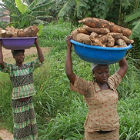Human Rights of Women
Researchers in Africa are collaborating on a project that aims reveal the barriers affecting women who run micro, small and medium-sized enterprises (MSMEs).
The Gender and Enterprise Development in Africa (GENDA) project, set to take 18 months, will be carried out in Kenya, Mozambique, Uganda and Zambia. It will offer two competitive US$150,000 grants to research teams from those countries.
The project follows a rising evidence that gender inequalities disadvantage women - especially at the micro level - and harms Africa's potential growth.
Whereas women play an important role as workers and entrepreneurs to growth and the economic security of households, they remain confronted with various challenges such as lower pay than men for doing the same work.
"There is consistent partitioning of women into activities deemed to constitute 'women's work'. For example, many more women work in the services sector (mainly commerce, particularly informal trading) than men," says GENDA's call for research proposals.
Businesses found and run by women are on the increase in Africa but there is very little research on them.
Charles Ackah, project leader at the University of Ghana's Institute of Statistical, Social and Economic Research, says the project "will examine the nature of MSMEs to help unleash Africa's productive potential and strengthen economic growth, with a kick-start in the four focus countries".
Its main objective, Ackah tells SciDev.Net, is to expand knowledge on enterprise development and entrepreneurship by examining the dynamics of businesses owned by women. In addition, it will provide perspectives on the institutional arrangements shaping innovation, technologies, productivity and market performance.
He says the research will generate new knowledge on the differences, constraints and performance gaps between MSMEs owned or run by men and women; the factors that contribute to these gaps; and measures that have the potential to reduce gender-based barriers - including the use of information and communication technologies (ICTs).
It could also help narrow the gender-specific barriers to entrepreneurship, influence the full participation of both women and men in the development of Africa's private sector and strengthen links between research and policy, he adds.
Ackah says the project was first mooted for Ghana but developed into a comparative work involving four other countries.
"We wanted to see how experiences differ across countries and where commonalities can be identified," he adds.
GENDA invited proposals from teams in the focus countries and is financing them with support from Canada's International Development Research Centre.Projects selection will be completed by mid-May.
Akosua Darkwah, head of the Centre for Gender Studies and Advocacy at the University of Ghana, says businesses founded by women entrepreneurs are gaining ground in Africa but little research has been done on them. "Availability of rigorous empirical evidence on them is still scarce," she notes.
Gender and population expert, Elizabeth Ardayfio-Schandorf, a fellow of the Ghana Academy of Arts and Sciences, hopes the study will expose performance gaps between men and women enterprises.
Policymakers, she believes, need more studies on the shortcomings, prospects and dynamics of MSMEs.
 Very little research has been done on the role of women as workers and entrepreneurs in Africa
Very little research has been done on the role of women as workers and entrepreneurs in Africa
Flickr/IITA Image Library
